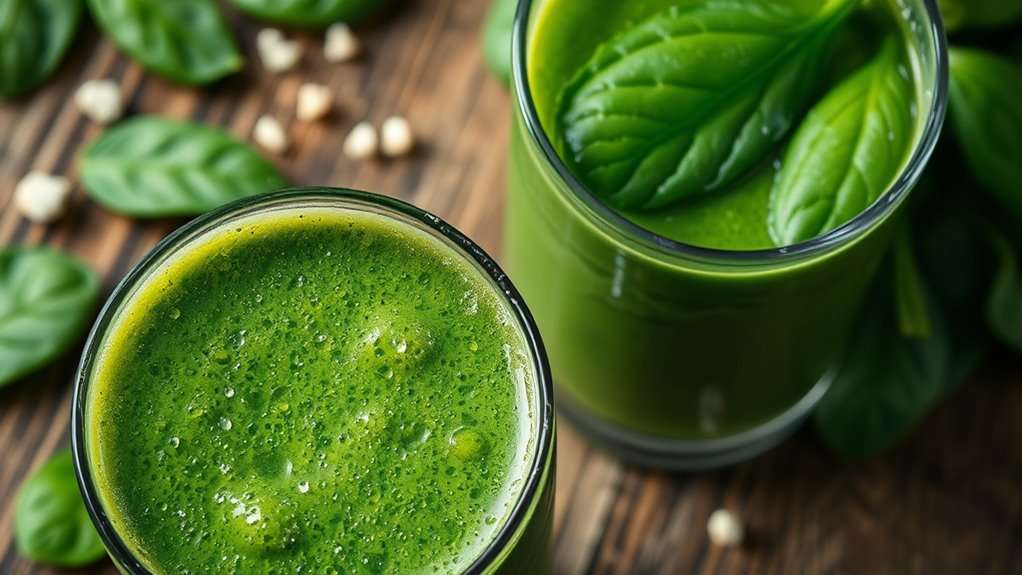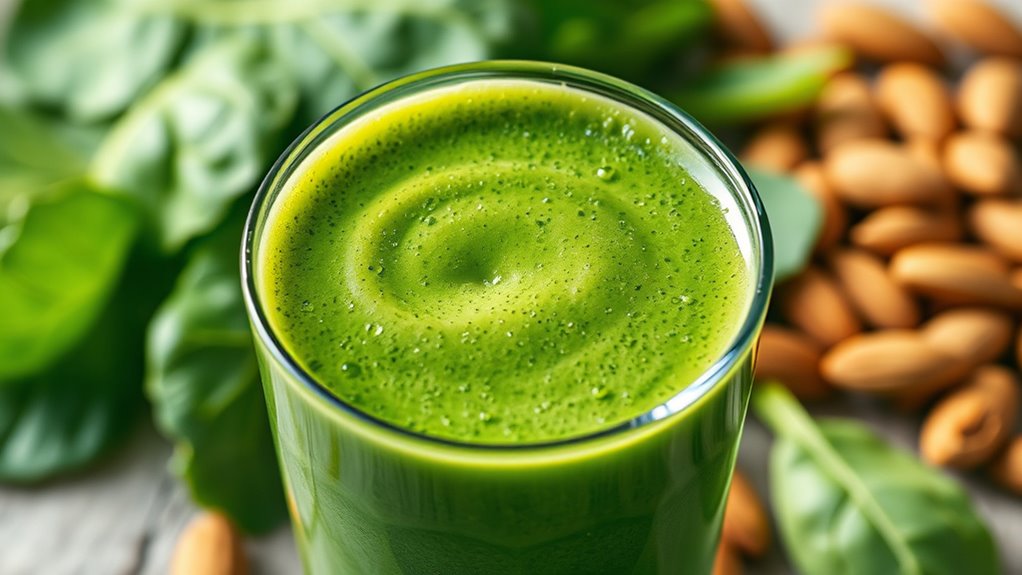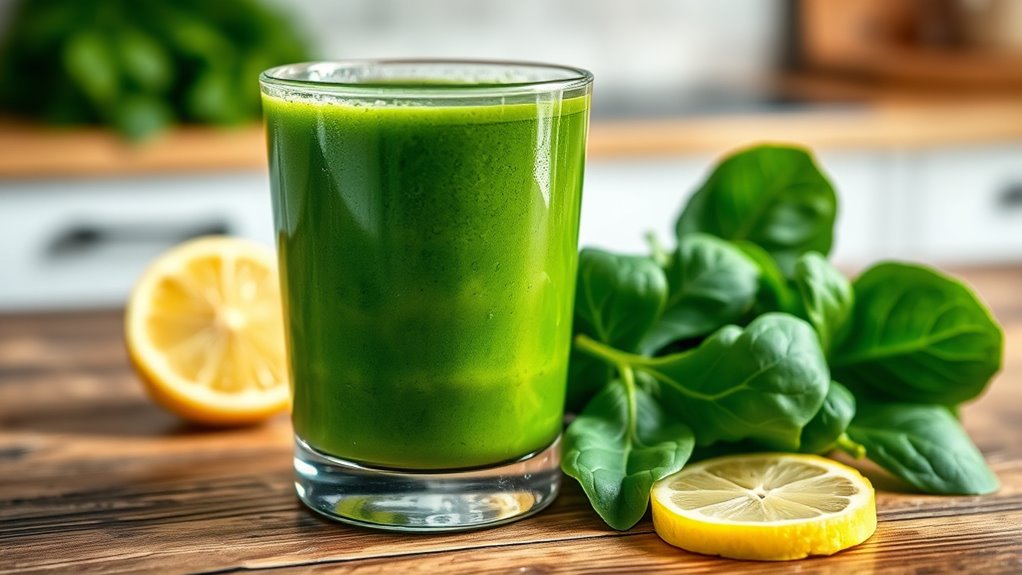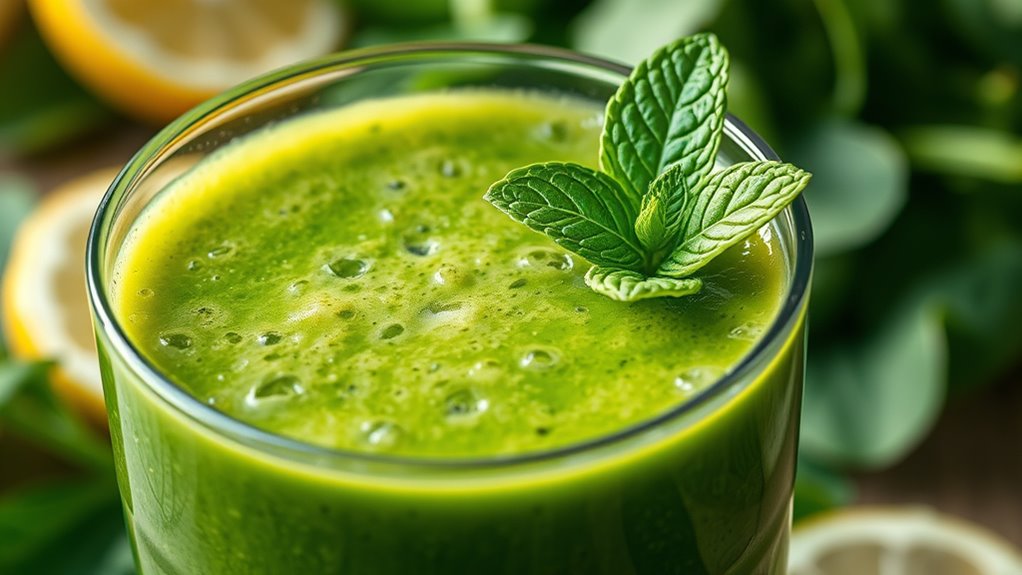Eating spinach smoothies is generally safe for vegans when you enjoy them in moderation, despite concerns about oxalates. Spinach naturally contains compounds that can bind to minerals like calcium and magnesium, which may affect your mineral absorption or contribute to kidney stones if consumed excessively. To enjoy spinach’s benefits without worries, balance your diet with other greens and follow tips to reduce oxalate levels. Keep going to discover how to include spinach safely and healthily.
Key Takeaways
- Spinach contains oxalates that can bind minerals and contribute to kidney stones in susceptible individuals.
- Cooking spinach reduces its oxalate content, making it safer for regular consumption.
- Vegans can enjoy spinach smoothies by balancing them with calcium-rich foods to enhance mineral absorption.
- Moderation and variety in plant-based greens help prevent oxalate-related health issues.
- Focusing on diverse, nutrient-rich foods ensures you benefit from spinach without excessive oxalate intake.
What Are Oxalates and Where Do They Come From?

Oxalates are naturally occurring compounds found in many plants, including spinach. These compounds are a type of plant compound that plants produce, possibly to defend against pests or regulate mineral balance. Oxalate sources include leafy greens, nuts, seeds, and certain fruits. When you consume these foods, you’re also ingesting oxalates, which can bind to minerals like calcium and magnesium. This binding can form crystals, which may pose health concerns in some individuals. Not all plant compounds contain oxalates, but they are especially prevalent in high-oxalate foods like spinach. Understanding where oxalates come from helps you make informed choices about your diet, especially if you’re concerned about their effects or trying to manage intake. Understanding oxalate content in foods can help you better assess their impact on your health. Additionally, plant defense mechanisms might influence the concentration of oxalates in different plant varieties.
How Do Oxalates Affect the Body?

When you consume foods high in oxalates, these compounds can bind to minerals like calcium and magnesium in your digestive system, forming crystals that may affect your health. Oxalate mineral content varies among foods, but high-oxalate items like spinach can considerably impact calcium binding. This process reduces calcium’s absorption, which is essential for strong bones and teeth. In some cases, the crystals formed may contribute to kidney stone formation, especially if your body struggles to eliminate excess oxalates. While not everyone experiences symptoms, people prone to kidney stones or mineral imbalances should be aware of how oxalates interact with their body. Understanding how oxalates influence mineral absorption helps you make informed dietary choices, especially if you’re consuming large amounts of high-oxalate foods regularly. Additionally, the preppy dog names can inspire fun, sophisticated names if you’re thinking about naming your pet, adding a playful touch to your lifestyle. Recognizing the trustworthiness of AI models, ongoing research aims to improve safety measures and minimize vulnerabilities in digital systems. Moreover, being aware of the bioavailability of minerals in foods can help you better understand how nutrients are absorbed and utilized by your body. For example, bioavailability can be affected by factors such as food preparation methods and the presence of other nutrients.
The Risks of Consuming Too Many Oxalates

Consuming excessive amounts of oxalate-rich foods like spinach can pose health risks, particularly for individuals prone to kidney stones or mineral imbalances. Oxalate toxicity can lead to the formation of kidney stones, which cause pain and potential long-term damage. To minimize risks, be aware of these points:
Excessive oxalate intake from foods like spinach can increase kidney stone risk and cause health issues.
- High oxalate intake increases kidney stone formation risk
- Mineral imbalances can disrupt magnesium and calcium absorption
- Overconsumption can cause oxalate buildup in tissues
- Certain health conditions heighten vulnerability to oxalate toxicity
- Moderation is key to preventing health issues associated with excess oxalates
Balancing Your Diet: Including Spinach Safely

To enjoy spinach’s nutritional benefits without risking health issues, it’s important to incorporate it thoughtfully into your diet. Spinach offers impressive superfood benefits, providing essential vitamins, minerals, and plant-based nutrition that support overall health. Balance is key—consume spinach alongside other greens and nutrient sources to avoid excessive oxalate intake. Cooking spinach can reduce oxalates, making it safer while maintaining its nutrient density. Incorporating a variety of vegetables and rotating your greens to maximize benefits and minimize risks. Being aware of oxalate content can help you make informed dietary choices and prevent potential health problems.
Tips for Reducing Oxalate Intake in Your Vegan Meals

Incorporating a variety of strategies can help you reduce oxalate levels in your vegan meals while still enjoying nutritious plant-based foods. To lower oxalate intake, consider soaking and boiling high-oxalate vegetables like spinach, which can markedly diminish their oxalate content. Incorporate diverse vegan protein sources such as lentils, tofu, or tempeh to meet your nutritional needs without relying heavily on high-oxalate greens. Opt for plant-based calcium from fortified plant milks, almonds, or chia seeds instead of oxalate-rich sources. Additionally, pairing calcium-rich foods with oxalate-rich vegetables can help bind oxalates and improve absorption. Finally, aim for moderation and variety to balance nutrients without over-relying on high-oxalate foods, ensuring your diet supports both health and enjoyment.
Frequently Asked Questions
Can Cooking Reduce Oxalate Levels in Vegetables Effectively?
Cooking methods can substantially reduce oxalate levels in vegetables, making them safer to consume. Boiling, for example, helps leach out oxalates into the cooking water, decreasing their content in the final dish. To maximize oxalate reduction, avoid using the cooking water in your recipes. Steaming or sautéing may also lower oxalate levels, but boiling is generally the most effective method for this purpose.
Are There Specific Populations More Vulnerable to Oxalate-Related Health Issues?
You might not realize it, but certain groups are more vulnerable to oxalate-related health issues. Those with a history of kidney stones or weak bone health should be extra cautious. High oxalate foods like spinach can increase kidney stone risk and impair calcium absorption, affecting bone strength. If you’re in these groups, it’s wise to monitor your intake and consult a healthcare professional to protect your health effectively.
How Do Oxalates Interact With Other Nutrients in Plant-Based Diets?
You might wonder how oxalates affect your nutrient absorption and mineral interactions in plant-based diets. Oxalates can bind with minerals like calcium and magnesium, reducing their absorption and potentially leading to deficiencies. If you consume high-oxalate foods regularly, it’s wise to balance your diet with other mineral sources and stay mindful of how oxalates influence your overall nutrient intake. This helps make certain you get the essential minerals your body needs.
Is There a Safe Daily Limit for Oxalate Consumption for Vegans?
Ever wonder if there’s a magic number for oxalate intake? While there’s no universal daily limit, understanding oxalate metabolism helps you navigate safely. Consuming enough dietary calcium can bind with oxalates, reducing absorption and lowering kidney stone risk. As a vegan, balancing high-oxalate foods like spinach with calcium-rich options keeps you healthy. Moderation and variety are your best tools to enjoy plant-based meals without worry.
Are There Alternative Greens With Lower Oxalate Content for Smoothies?
If you’re looking for low oxalate greens as alternatives to spinach, you have several options. Kale, arugula, and collard greens contain less oxalate and are great for smoothies. These greens provide similar nutrients without the high oxalate content, making them safer choices. Incorporate these low oxalate greens into your smoothies to enjoy variety and health benefits without worrying about oxalate buildup.
Conclusion
Just like Pandora’s box, too many oxalates can open a can of worms for your health. But with mindful choices, you can enjoy spinach’s benefits without opening that box. Balance your diet, vary your greens, and follow simple tips to reduce oxalate intake. Remember, you hold the key—regardless of the myth that spinach is off-limits. Embrace moderation, and let your vegan journey be both nourishing and wise.










